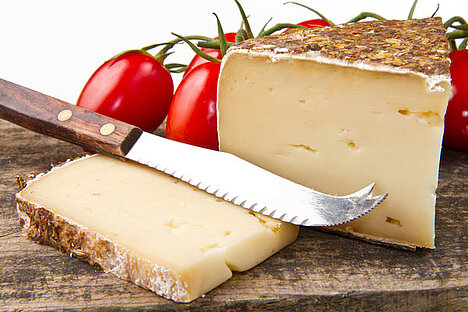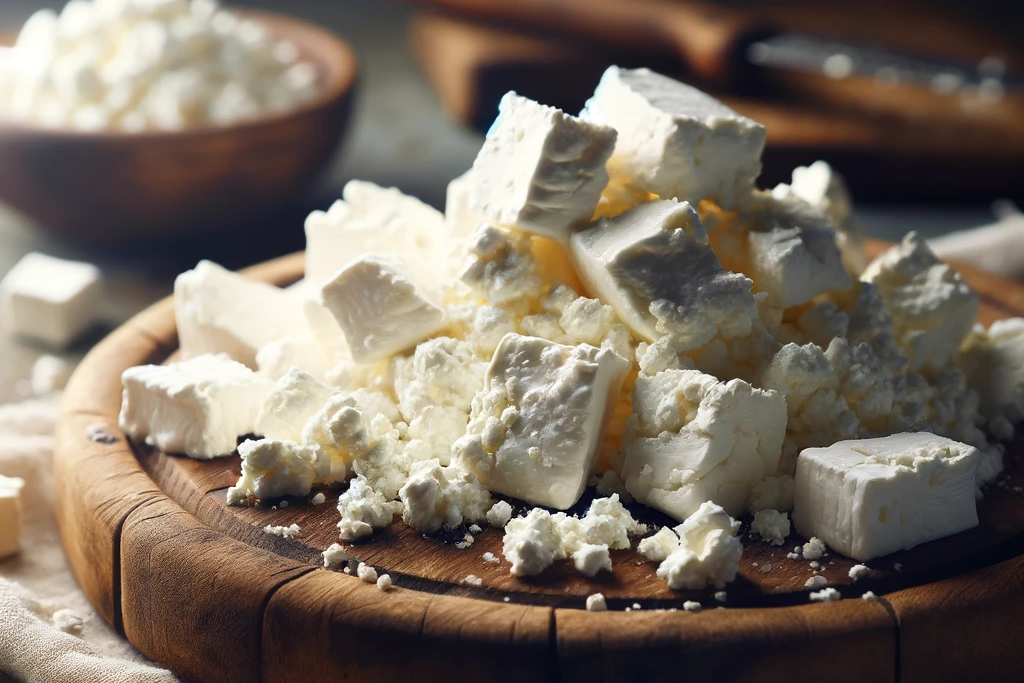Cheese

What is cheese?
Cheese is a dairy product that coagulates through the addition of rennet or other enzymes. This produces a solid mass, the curd, and a liquid, the whey. The curd is further processed by pressing, salting, seasoning or maturing. Depending on the type of processing, different types of cheese are produced, which differ in taste, consistency, fat content and lactose content.
Lactose is the milk sugar contained in milk. It is normally broken down in the intestine by an enzyme called lactase. However, many dogs are lactose intolerant, which means that they do not produce enough lactase or none at all. As a result, the lactose is not digested in the intestine but ferments. This can lead to digestive problems such as abdominal pain, flatulence or diarrhea.
Which types of cheese are allowed for dogs?
Not all cheeses are suitable for dogs. As a general rule, the longer a cheese is matured, the less lactose it contains. This means that hard cheeses such as Emmental, Gouda or Parmesan are better tolerated than cream cheese, soft cheese or processed cheese. Moldy cheeses such as Roquefort or Camembert are also taboo for dogs, as they can contain toxic substances.
You should also make sure that the cheese does not contain too much fat, salt or spices. These can put a strain on the dog or even harm it. Cheese that has been processed into a spread is also unsuitable as it often contains additives such as sugar, flavorings or preservatives.
What are the advantages and disadvantages of cheese for dogs?
Cheese has both advantages and disadvantages for dogs. The advantages include:
- Cheese is a good source of high quality protein, which is important for muscle building and cell regeneration.
- Cheese contains many minerals such as calcium, potassium and magnesium, which are important for bones, nerves and muscles.
- Cheese tastes very good to many dogs and can be used as a reward or motivation during training.
The disadvantages include:
- Cheese can cause digestive problems in dogs with lactose intolerance.
- Cheese can cause health problems in dogs with obesity or fatty liver, as it contains a lot of fat and calories.
- Cheese can cause skin rashes, itching or ear infections in dogs with allergies or intolerances, as it often contains milk protein or other allergens.
How much cheese can my dog eat?
Cheese is not a staple food for dogs, but a treat. This means that it should only be fed in small quantities and not on a daily basis. As a rule of thumb, cheese should not make up more than 10% of your dog's daily calorie intake. Of course, this depends on your dog's size, weight, age and activity level. To give you an idea, here are a few examples:
- A small dog (5 kg) can eat about 10 g of cheese per day.
- A medium-sized dog (15 kg) can eat about 30 g of cheese per day.
- A large dog (30 kg) can eat about 60 g of cheese per day.
You should cut the cheese into small pieces and offer it as a reward or snack. Make sure that you subtract the amount of cheese from the normal food ration to avoid overfeeding. Also observe how your dog reacts to the cheese. If he shows signs of intolerance or discomfort, you should omit the cheese or try a different variety.
Cheese is not a must for dogs, but it's not a no-go either. It can be used in moderation as a treat or supplement to your dog's diet, as long as you choose the right type and amount. Cheese can provide your dog with valuable nutrients, but can also lead to problems if it is fed too much or too often. Therefore, always pay attention to the quality, tolerance and your dog's reaction to the cheese. And don't forget to treat your dog to other healthy snacks such as fruit, vegetables or meat.
If you notice any signs of hypersensitivity or poisoning in your dog, you should see your vet immediately. We are not a substitute for a vet, but we try to be as accurate as possible. Every dog reacts differently and we recommend you get a second opinion or consult your vet if in doubt.
Stay healthy and take good care of your four-legged friend!😊
Similar to Cheese
Mozzarella is a fresh cheese that originally comes from Italy. It is made from pasteurized or unpasteurized milk, which is first curdled with rennet. The solid mass is then kneaded in hot water and...
Cheddar is a hard cheese that is made by heating and pressing milk. The whey is separated and the cheese mass is pressed into molds. The cheese then matures for several months to years, depending on...
Gouda is a semi-soft semi-hard cheese from the Netherlands. It is made from pasteurized or raw cow's milk with the addition of rennet and lactic acid bacteria. The cheese mass is pressed into molds...
Feta is a soft cheese that originated in Greece and is matured in brine. It has a white color and a crumbly texture. Feta can be made from pure sheep's milk or from a mixture of sheep's and goat's...



